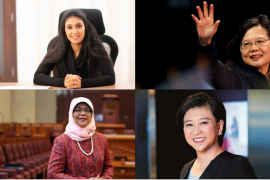By: Tihomir Gligorevic
Isabel Allende Bussi, the first female leader in the 83-year history of the Socialist Party of Chile (PS) and daughter of famed former leader Salvador Allende, has said that she will present herself as a candidate on behalf of her party in the 2017 presidential election.
The 71-year-old Santiago native announced her intention to campaign for the presidency to colleagues at the general council of her party just days before the 43rd anniversary of her father’s death in the Moneda, the Chilean seat of power.
“I have explicitly stated my desire to be the presidential candidate and I pointed out the need for broad citizen participation in determining the leadership of the New Majority,” Allende Bussi said in reference to her future plans and the center-left’s political alliance.
In addition to Allende Bussi, several other individuals have voiced their intentions for candidacy.
Ricardo Lagos of the center-left Party of Democracy (PPD), a former president (2000-2006) and noted political figure is on the shortlist of New Majority candidates, as are former Organization of American States (OAS) Secretary General José Miguel Insulza of Allende Bussi’s PS and Alejandro Guillier, independent but linked to his former centrist colleagues in the Radical Party.
Allende Bussi’s calls for “broad citizen participation” in determining leadership referred to the wish for a new system that includes primary voting.
Currently, presidential candidates on behalf of alliances are chosen by the high-ranking leaders of political parties, but Allende Bussi and Lagos both want to do away with the system and instill a simple primary voting system. Early polls conducted by private firms show the four early candidates have very similar numbers of approval.
In the vein of internal competition, Allende Bussi has personally called for unity and “one hundred percent loyalty” to the ideals of her party and alliance, and she has urged her colleagues to “avoid friendly fire” within the political coalition.
Allende Bussi’s ascendancy has been several years in the making now as in mid-2015, she became the first female leader in the 83-year history of the Socialist Party of Chile.
In 2014, the youngest of Salvador Allende’s three daughters announced her candidacy for the intraparty elections that would decide the new President of the Chilean Socialist Party, a position her father also occupied from 1943 to 1944 when it was known as the ‘Secretary General’ of the party.
Some six months later, the 112-member Central Committee of the Socialist Party elected Allende to be the party’s new head by a wide margin. Allende Bussi heads the Nueva Mayoría (New Majority) Socialists, a block of the party that supports fellow Socialist Party member, President Michelle Bachelet’s ruling coalition of the same name.
At the passing of power ceremony, symbols of Allende and Chilean past were clearly present. The ceremony itself was held in the former National Congress of Chile building, which, until 1973, had served in its congressional capacity until it was mostly shuttered and Congress was moved to the coastal city of Valparaíso years later after the return of democracy where it remains today.
Three years prior in 1970, the building hosted the presidential swearing-in ceremony for the democratically-elected Salvador Allende. On September 11, 1973, Allende was faced with a violent coup staged by the Chilean Armed Forces led by Augusto Pinochet (who would then rule with an iron fist until 1990). With the Moneda being bombed from above and about to be invaded on the ground, Allende killed himself rather than surrendering.
Apart from the building, Allende Bussi herself evoked her father not only through food served (empanadas and red wine, cited from a speech made by her father where he spoke of “celebrating the victory of socialism the Chilean way” through those two items) but directly through words.

“My colleagues, you all know that for me, the Socialist Party of Chile has been much more than just a political party. It has been my home and it has been the home of President Allende, my father, and the home of ‘Tencha’ (the nickname given to Hortensia Bussi, her mother), but it has also been my cause,” Allende Bussi said.
“Thank you to everyone, all of the Socialist Party politicians and members in society, for welcoming me and our party into their homes, into their social circles and public events, and thank you dearly for everyone who voted for me and made me the President of the Socialist Party of Chile,” explained the longtime politician.
“We are proud to be part of President Bachelet’s party,” she continued, “we are proud to be part of Salvador Allende’s party, we are proud to be part of the New Majority and to further this coalition and its aims, we must work with a tremendous amount of conviction, responsibility and unity, regardless of who is leading us.”
In recent times, Allende Bussi has also strengthened her ties with Bachelet, with both women having said that they are “Allende personified” in the sense that they are carrying on the former leader’s legacy as Socialist Party representatives.
In March of 2014 when Bachelet was inaugurated for the second time (having led Chile from 2006 to 2010), she received the red, white and blue presidential sash from Allende Bussi in an emotional handover-of-power ceremony, where the Senate President traditionally places the garment on the newly-elected leader on their first day in power.
Weeks before, Allende Bussi was appointed to head the upper house of the Chilean Congress, a position officially titled the Chair of the Senate, by Bachelet and the New Majority. This made Allende Bussi the first woman, and only the third Socialist Party member, in Chilean history to hold this powerful position; one of the two others was her father, who served as Senate Chair from 1966 to 1969.
The powerful moment shared by the two women was made even more poignant given their shared histories. Both Allende Bussi and Bachelet were born to fathers who held important posts; the former’s was President and the latter’s was a prominent General in the Air Force. Both men died as a result of the 1973 coup. Both women joined the Socialist Youth and were forced to flee the country in their young years, finally returning just before the reintroduction of democracy in 1990 and entering politics.
“We spoke a few days ago,” Allende Bussi said of Bachelet shortly after the Senate ceremony, “and we were thinking the same thing: that both our parents would be attending the Rite of the Republic in spirit.”
Just after the Moneda was bombed, Isabel fled to Mexico along with her mother and sisters where they were granted political asylum. They stayed there, with the exception of Beatriz (one of the sisters) who moved to Havana and died there in 1977, until 1989 as the Pinochet dictatorship was coming to an end.
After seeing her father’s remains exhumed and given a proper state burial during the rule of Patricio Aylwin (1990-1994), the first democratically-elected leader since Salvador Allende in 1970, Allende Bussi entered politics with the Socialist Party by winning a seat in the Chamber of Deputies (lower house of Congress) as a Deputy in 1994 and remaining there until 2010 (with a stint in 2003 and 2004 as President of the Chamber of Deputies). She took another step forward in Chilean politics when she won a Senate (upper house of Congress) seat in 2010, representing the northern Atacama Region.



